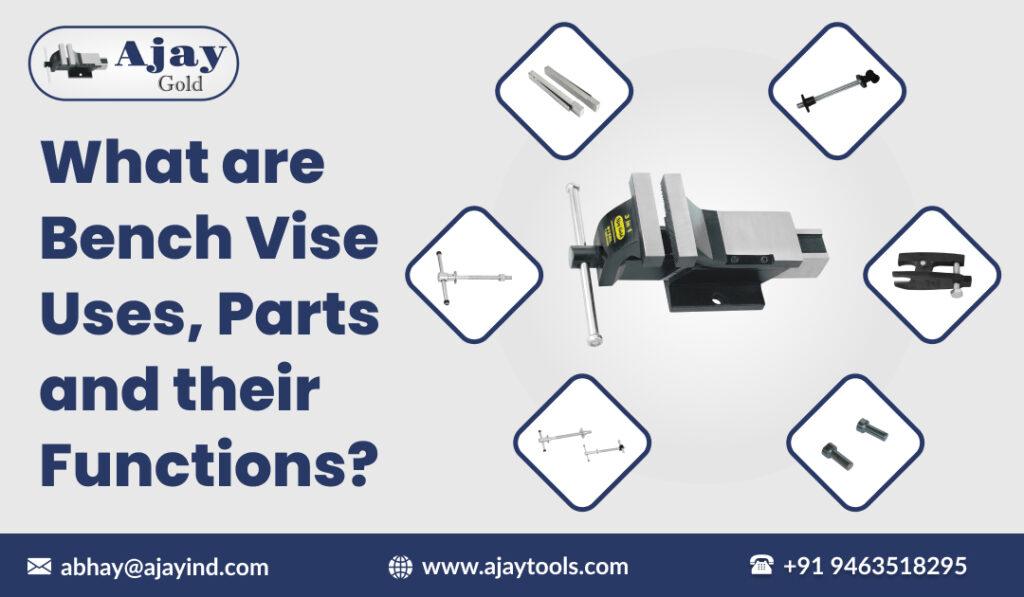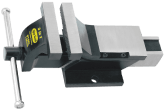If you are reading this blog, then most probably you will be looking for the best bench vice for your use. A bench vice is an important tool in everyone’s workshop. They can be used for clamping things or holding objects securely in the workshop. The tool has a simple mode of function, as simple and easy as turning the handle will help the bench vice close jaws when they are open. In today’s blog, we will discuss common bench vise parts, different types of bench vices and the uses of those vices. Let’s get started:
What is the Use of a Bench Vice?
The vise is the most important tool in any workshop. It is the most commonly used tool by workshop owners and handymen. Basically, a bench vise is used to hold a specific object and perform different operations, such as drilling, milling, filing, sawing, and so on. Take a look at the points written below to know bench vise uses:
- Glueing Generally, in carpentry work, there is a task of glueing to stick two objects together. When sticking two different objects, then there is a need for high pressure to hold those pieces. For this, holding pieces by using a bench vice would be the best option because, with this method, workers don’t need to waste their time holding those pieces.
- Cutting of Metal ProductsBench vices can be used when there is a need for cutting metal products. For a perfect cut, one end of the metal should be secured or held tightly, and it can be done with the help of a vice. In addition to this, manufacturers of bench vises, use high-quality bench vice material.
- Sawing Sawing is another important task in carpentry. During the sawing process, the pile of stock must be cut perfectly. Holding a piece of an object at the right position is essential to get the right shaped wooden piece. To hold the object for sawing purposes, bench vice suits the best.
- Drilling
Drilling is involved in carpentry, plumbing, interior decors and electrical fittings. Drilling needs stability and precision. A bench vise can be used to secure the driller in the right position to drill the holes. Bench vise gives accurate stability for the tool that is being used.
- Sanding Sand paper is used to give the finishing touch in various applications like painting, etc. When using sand paper on an object, then the object must be secured tightly and a bench vise can help in holding the object.
What are Bench Vise Parts and Functions?
Bench vise consists of two parallel jaws for holding an object. One of the jaws is static, and the other is movable. The following are common parts of a bench vice:
- Base The base of the bench vise is used to attach to your workbench, or sometimes griped into the place. The base can hold everything together, and it is the most basic part of the structure. You can have two options in a bench vise: swivel base and fixed base.
- Jaws
Bench vice’s one jaw is fixed, and the other is movable. A movable jaw can move back and forth to match the size of the object to perform an operation. In addition to this, there are plates located inside the jaws that are fixed by a screw.
- Spindle There is one spindle that is used to move a movable jaw in the forward and backward directions.
- Handle The handle is attached to the spindle, and then rotates the handle anticlockwise and clockwise direction, and then the spindle moves forth and back.
- Main Screw The main screw is one of the most important parts of the bench vice. When pressure is applied to the handle, then it is converted into the movement of the sliding jaw that moves toward the static jaw. The main screw is vital if it is not manufactured, then the vice will not be able to hold objects well.There are various bench vice manufacturers in India, and they manufacture different types of bench vises by using high-quality material. As we have mentioned that bench vices are important in every workshop, so a workshop is incomplete without a bench vice.
Different Types of Bench Vices
The following are common types of vices:
- Pipe vice
- Machine vice
- Metalworking vice
- Woodworking vice
- Heavy-duty vice
- Chain vice
Conclusion
The purpose of this blog is to share information on bench vise parts and functions, bench vice types, and their uses. If you want to buy a bench vice for your workshop, then make sure to check the bench vice material to ensure that it will have a long service life.


